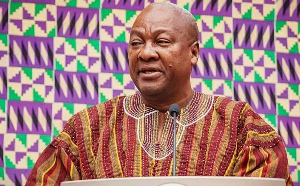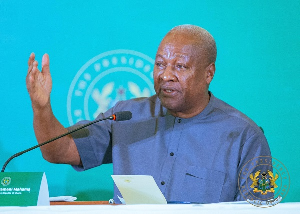By Kofi Ata, Cambridge, UK
“......We will provide free education to Ghanaians regardless of ethnicity, religion, sex or background for that is the only way to break the cycle of poverty and deprivation and misery that has engulfed our people”.
The above quote was attributed to Dr Bawumia (the running mate of Nana Akufo-Addo, Presidential candidate of the main opposition party, NPP) and reported on Ghanaweb (see “Bawumia seeks God’s guidance for victory 2012”, Ghanaweb April 7, 2012). I believe Dr Bawumia was referring to Nana Akufo Addo’s election promise to make Senior High School (SHS) education free in Ghana if elected as President. I was very disappointed when I read the above quote for a number of reasons. First and foremost, Dr Bawumia is an accomplished Economist and a Banker should have known that, what he said was inaccurate. because he comes from northern part of Ghana where secondary education has been free since independence, yet the three northern regions (Northern, Upper East and Upper West) are some of the most deprived areas with higher levels of poverty and misery in Ghana. Last but not the least, free SHS education or free education is definitely not “the only way to break the cycle of poverty, deprivation and misery” in Ghana.
I accept that Br Bawumia used the words “free education” and not free senior high school. But assuming my understanding that he was referring to Nana Akufo-Addo’s proposed free SHS policy is wrong, then was he proposing a new education policy since freed education is different from free SHS education? If so, is Bawumia clear about what Nana Addo’s proposal is about? These and other questions made me come to one possible conclusion and that is, perhaps, the proposed free SHS education policy is a big deception, similar to the then candidate Mills’s one time National Health Insurance premium payment that has turned out to be undeliverable. Is it not interesting that the policy proposal that is still under development, yet the newly crowned running mate has expanded the remit of the policy when in fact, Nana Addo was unable to tell BBC’s global audience or listeners how much the free SHS would cost. Could Bawumia tell Ghanaians how much his free education would cost when Nana Addo did not know how much free SHS education will cost?
I also acknowledge that Nana Akufo-Addo’s policy statement included a comprehensive programme of economic development but Dr Bawumia did not male reference to that programme and as an Economist, he should know that free education alone will not eliminate poverty, deprivation and misery in Ghana. Free education must be complimented by job creation, through industrialization, infrastructure development, other economic and social interventions to lift Ghanaians out of poverty. Without such a holistic approach to socio-economic development, free education alone at best, would create an army of educated youth without jobs. Already, there are thousands of unemployed graduates in Ghana, so free SHS education without job opportunities will result in more unemployed educated population. That is equally uneconomical as it would lead to waste of scarce resources. Again, if thousands of university graduates are already unemployed what makes Bawumia to claim that freely educated Ghanaians will eliminate poverty, let alone free SHS education? Is that not dishonesty, deceptive or even delusional?
Personally, I subscribe to Nana Addo’s proposed policy of free SHS, though not in its current form. A number of personalities and organisations, including the Vice-President and IMANI respectively have raised a number of questions that put in doubt the veracity of the proposal. I share some of those concerns that proposal is not carefully thought through. I suggest that Nana Addo if elected implements the proposed policy in two phases. Instead of Nana Addo offering free SHS education as President, his priority (the first phase) should be to widen access to SHS education throughout Ghana (both quantitatively and qualitatively). That is, the policy must first address the problems of accessibility before affordability, though both are two sides of the same coin. There is no point in providing access to senior high schools throughout Ghana if most parents cannot afford the cost and vice-versa. However, accessibility comes first. It’s not a question of chicken and the egg, which one came first.
At the moment, many areas in Ghana have no senior high schools, especially in rural areas. Again, most of the few senior high schools in rural or deprived areas are of low academic standards because they lack the requisite facilities and qualified teachers. This is not unusual because Ghana’s development (and in most African countries) is based on what could be described as “urbantheid”. That is, in favour of urban areas and biased or discriminatory against rural areas though the development cows that the state milks (cocoa farmers) for development live in rural Ghana. Please note that the use of “development cows” to represent cocoa farmers is a metaphor and not intended to disrespect the Ghanaian heroes. It is also to express the disproportionate heavy burden of taxation on cocoa farmers as well as how unfair and exploitative the relationship between the state and cocoa farmers is.
After a major expansion and improvement in senior high schools by way of infrastructure development and teacher training programme, the second phase of the policy of free senior high school education could be implemented. Indeed, the policy would only be truly successful if tertiary education is also expanded because there is little to be gained by producing hundreds of thousands of senior high school leavers if majority of them will not have the opportunity to further their education beyond senior high school as it is at moment. I disagree with those who say the policy would be too expensive and Ghana cannot afford it. As it is often said, education is not cheap and ignorance is even more expensive. If Ghana is to develop into a strong economy with well developed industrial and service sectors, she will require well educated and trained workers with skills in various fields.
IMANI has criticised the policy as an unnecessary subsidy for some parents because it is the responsibility of parents to cater for their children and they already care for lodging and boarding at senior high schools and at home. Perhaps, IMANI is suggesting that the policy should be means tested so that rich parents whose children not only enjoy senior high education but also the best ones are exempted from the policy. This option would be too complex and expensive to implement because Ghana does not keep proper records of family incomes and wealth. Again, corruption would make its implementation ineffective as the wealthy and influential can easily manipulate the system to gain free SHS education for their children. The experience is nothing to be proud of because the introduction of Cocoa Marketing Board scholarships for children of cocoa framers actually benefited the children of non-cocoa farmers more than those of cocoa farmers. (mostly the children of the well educated and well connected in cities and towns were awarded the scholarship) Again, the free education in the northern regions is not means tested since both rich and poor families in the north benefit equally. I do not think the National Health Insurance which is also a kind of subsidy is means tested and I personally do not see the rationale behind the policy being made means tested on the basis of cost.
The alternative is to introduce it in deprived areas first since majority of children who attend the best senior high schools in urban areas are from well to do families who are reasonably capable of paying lodging and boarding fees. The success or otherwise of implementation of the policy in deprived areas could be used to inform the expansion into the rest of the country, that is, within the seven remaining regions of Ghana (as the three northern regions already enjoy free senior secondary school education).
Though questions still remain on how Nana Akufo-Addo will fund his free senior high school election promise or covenant, let alone Bawumia’s free education, the idea is a good one and should be probed and debated by Ghanaians to improve and strengthen it, even if there are doubts about whether it is an empty election ploy or a serious commitment by NPP to continue Kwame Nkrumah’s education policies. The problem is, the longer it takes Nana Akufo-Addo to lay bare the cost of his proposal and how it would be funded, some of us will doubt the honesty of his commitment to delivering on this election promise. It is even more worrying when his running mate is claiming that they will offer not only free senior high school education but free education to all Ghanaians. Nana Akufo-Addo and his running mate must learn to sing from the same hymn sheet, otherwise, they give room for suspicion.
If Dr Bawumia has not sufficiently been briefed on the policy, he must familiarise himself with the policy before making public pronouncements because free SHS education is definitely not the same as from free education. Dr Bawumia should also know that free education alone will not end poverty, deprivation and misery in Ghana. Lack of or poor education is only one of the symptoms of poverty, deprivation and misery and so the right prescription will require more than free education. Ghanaians should not be deceived into believing that free senior high school or free education will turn the nation into milk and honey, unless the policy itself is a deception. Accessible and affordable education is not an end in itself but one of the means to an end to the eradication of abject poverty in Ghana.
Kofi Ata, Cambridge, UK
Opinions of Monday, 16 April 2012
Columnist: Ata, Kofi














